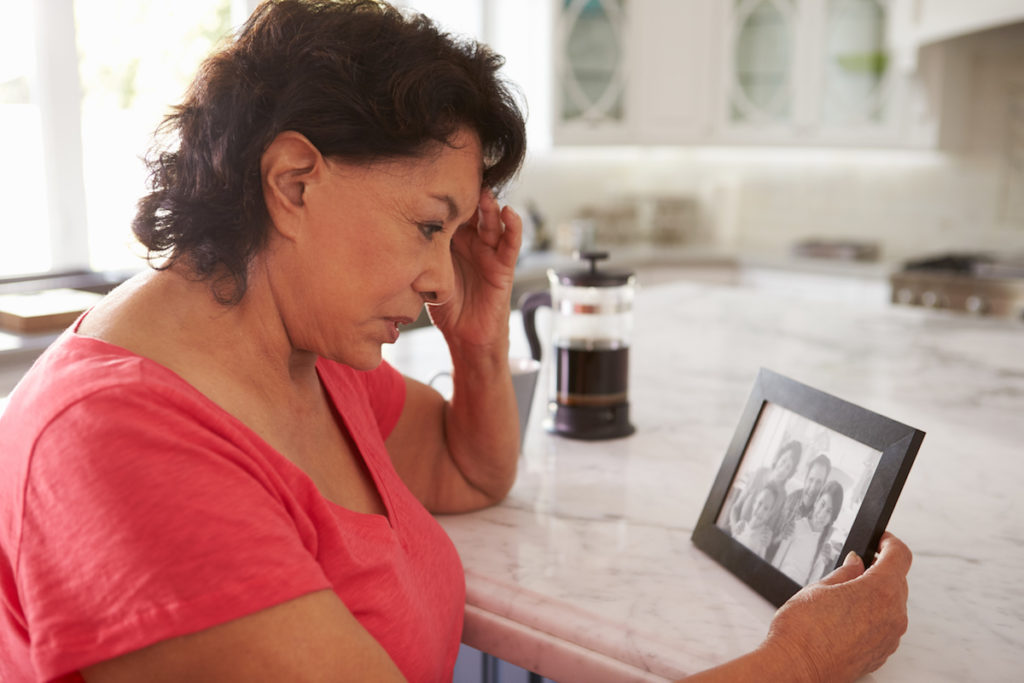Lorelie Rozzano is a guest blogger for Vertava Health.
Grieving The Loss Of Someone Who Still Lives
— A mother weeps quietly into her pillow at night. Her arms ache to hold her dying child, but she doesn’t know where he is. A husband cries in the shower. His wife has been gone for two days. His mind races with alarm. He pounds his fists on the shower wall. He can’t stand to think about what she might be doing, or who she’s doing it with. A sister holds a framed picture. A little boy and girl grin up at her from the glass. She remembered when it was her and her little brother against the world. They used to be inseparable, but all of that has changed now. Her brother is a stranger to her – one she doesn’t like very much. A child hugs her teddy bear thinking about her daddy. He used to read her stories and tuck her in at night. In his big strong arms, she felt loved and safe. But she hasn’t seen her daddy in a long, long time. She thinks about her daddy every day and wonders if it was her fault that he went away. The families above are experiencing what every family with addiction goes through, they are grieving the loss of someone who still lives. They will run a gamut of emotions. Confusion, anger, frustration, and sadness. Their grief is an individualized thing and there is no correct order or wrong emotional response. Many don’t understand how you can grieve for someone who is still alive, but it’s simple. While their loved one is not deceased, they are gone. Their heart still beats but they are psychologically different. They are not the people they once were. The relationship you had with them has changed. You take a back seat in their world because alcohol and drugs come before you and everyone else. In death, you are surrounded by the comfort of friends and family. There are arms to hold you and prop you up as you grieve. You’re encouraged to talk about the person you love and celebrate their life. [lorelie-callout] When you lose someone who still lives to addiction, an internal battle plays out. On the one hand, you’re grateful they’re alive. On the other hand, you’re mad as hell. Somewhere in the middle, you’re sick and exhausted and you don’t know what to do. It’s different than losing someone to death. Your pain is real, but it may be minimized, hidden or ignored – after all, your person is alive. However, your loved one is not who they once were and neither are you. When your addicted loved one disappears from your life or when they are too impaired to be effective, you live with a broken heart. What could have been, is always on your mind and you wonder if their addiction is your fault. Did you do something wrong? Could you have tried harder? Overwhelming grief occurs every time you think about them, which is most of the time. Grieving the loss of someone who still lives is like riding a roller coaster. One moment you have hope, the next you’re waiting for the dreaded phone call to arrive. It hurts when you realize you are not as important to someone as you thought you were. The sadness can be all-consuming and will come in waves. It’s natural to want to avoid emotional pain – but don’t. Feel the sadness. Don’t judge it. If a little voice whispers in your head – if they really loved me, they’d stop – squash it out. That voice is trying to take you away from your feelings, but sadness is a healthy emotion. Allow yourself to grieve. When you don’t grieve, healthy emotions turn toxic and can become resentment and self-pity. Some of us attach our well-being to our addicted loved one. We make it our job to fix and rescue them. We become so consumed by the changes in their behavior, we fail to see the changes in our own behavior. Others may feel like giving up – we just want to crawl into a deep hole with them and die. However, giving up won’t help them or you. Their addiction has nothing to do with their love for you. They are two different things. While you might think love would be more powerful than any substance, this is false and would negate the biological effects of addiction. The reward centers in their brain have become so strongly connected to their drug of choice or addictive behavior that getting high becomes automatic. The addict’s brain is wired to choose the addiction first. Denial tells them their problems aren’t that bad. It minimizes the consequences of their actions while glorifying the good times and euphoric high they get while using. They have a terminal illness that plays out through symptoms of delusion, denial, grandiosity, dishonest thinking, poor impulse control and impaired judgment. If only love were enough. Unfortunately, it’s not. While you can’t love your addicted family member well, there are things you can do to increase a successful outcome. First and foremost, practice self-care. You can’t help anyone else if you’re feeling sick and exhausted all the time. It’s important to know you’re not alone. Reach out for help. Embrace emotional wellness by sharing your pain with a group of safe people. Recovery occurs through connection. Instead of waiting for the impaired thinker to see the light, lead the way. Statistics claim that addicted persons have the best chance of success when their families are educated and in recovery too. If you or someone you know needs help, please call this confidential support line for assistance 844-470-0410.


